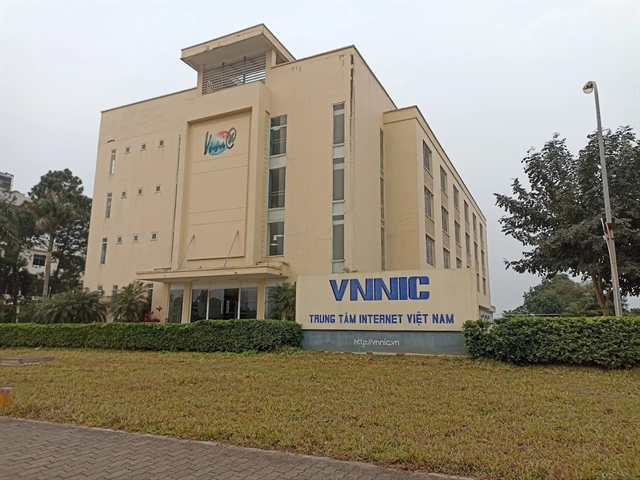 Society
Society

Lotus made debut early this week, making it the fourth homegrown social media platform launched in the last four months. It has also inspired people and local tech firms about the upbeat outlook of the “Make in Việt Nam” campaign.

|
| Nguyễn Văn Tuấn, VCCorp's deputy general director, introduced Lotus on its debut on September 16. VNA/VNS Photo Minh Quyết |
HÀ NỘI – New social media platform Lotus launched earlier this week, the third homegrown social media platform to go live in the last four months.
The move has given local tech firms the feel good factor over the “Make in Việt Nam” campaign.
Like many countries who have strong desire of becoming a tech giant, the Vietnamese Government in May this year launched the initiative “Make in Việt Nam”, which is aimed at encouraging local tech companies to manufacture their own products and then export them instead of assembling and outsourcing goods for foreign companies.
In the last four months, three social networks, developed and owned by Vietnamese companies, were introduced. They share the ambition of breaking the “monopoly” of foreign social networks and drawing users to the Vietnamese platforms.
In June, Hahalolo was launched and a month later saw the introduction of Gapo. Lotus was launched in the middle of this month.
Minister of Information and Communications Nguyễn Mạnh Hùng in a meeting in July called on local tech firms to develop “Make in Việt Nam” social networks in a different path from Facebook, creating platforms that could compete and replace Facebook and Google.
The local networks are expected to meet three criteria – sharing value with users, allowing users to contribute and complying with national law.
But is it easy for homegrown players to beat global tech giant in home soil?
Hahalolo, debuted on June 10, aims to attract two billion users worldwide by 2024 and seeks to list on the US Nasdaq by 2025. But the tourism-oriented social network was seen less developed in feature and content while being suspected to be a multi-level capital raising scheme.
In July, Gapo was launched after four months of getting VNĐ500 billion (US$21.5 million) investment from G-Capital. The platform hopes to have 50 million users by 2021 and pay users who contribute attractive content. Gapo shares many similarities with Facebook, allowing users to make friends, chat online and post comments and photos in a “news feed” style.
After a short suspension due to technical errors and system upgrades on September 15, one day before the Lotus debut, it claimed to have reached two million users.
Newcomer Lotus, developed and run by Vietnam Communications Corporation, expected to attract users with diverse and quality content.
With the theme “Content is King”, VCCorp’s general director Nguyễn Thế Tân said Lotus followed a different path, providing a platform supporting content contributors and individuals to access creative and quality content.
Tân said Lotus was working with more than 500 content creators in various fields such as education, lifestyle and economists.
Lotus has raised VNĐ700 billion ($30 million) from VCCorp and some domestic investors. The company plans to call for another VNĐ500 billion for its long term development.
Responding to concerns of its ability to compete with Facebook, which has 60-65 million users in Việt Nam, or 75 per cent of population, Tân said Lotus would not focus on “niche market” [product features aimed at satisfying specific needs] as many experts have presumed but striking big needs that other social networks are not responding well.
Prior to Lotus, Gapo or Hahalolo, many “made in Việt Nam” social platforms were born such as go.vn, yume.vn,tamtay.vn and zing.me but very few have stayed afloat. Zalo, which was also run by VNG, is a rare homemade success. The messaging and phone app service has grown big enough to become a social network with more than 100 million users as of last year (including in international markets such as the US, Japan, Myanmar and Taiwan).
Hoàng Thanh Tùng, an IT engineer in a Hà Nội-based company, raised his concerns about data privacy when using the Vietnamese platform.
Expressing his hesitancy in switching to another platform, Tùng told Việt Nam News: “I don’t want to publish my personal information on many social platforms. Vietnamese developers may not apply strict rules to protect user data like foreign providers.”
Data of the Ministry of Information and Communications has revealed nearly 460 social networks have been licensed to date, of which 48 were issued in the first half of this year. The Government is seeking to balance the user base with 50 per cent of Vietnamese social media users hopefully using homegrown networks by 2020.
Despite doubts in viability of local media networks, Minister Hùng have appraised efforts of local tech firms in developing Vietnamese products and hopes their works would inspire other company to follow the same path and contribute to the development of the Vietnamese technology sector. – VNS




